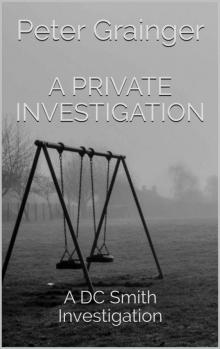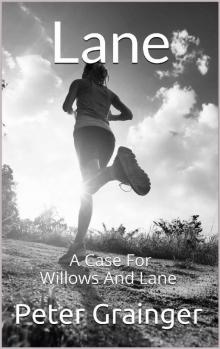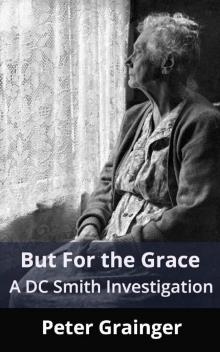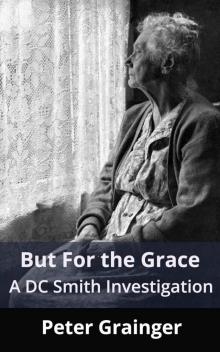- Home
- Peter Grainger
But For The Grace Page 7
But For The Grace Read online
Page 7
Much to his relief, Olive Markham was sitting at the desk in her tiny office. Above her head, mounted on the wall, was the golden face of a Buddha, its enigmatic smile a reminder that his own simple practice had been neglected recently. Now that he was on a case, he should pick it up again, set the alarm, starting tomorrow. He hoped that Olive wouldn’t inquire about it.
She looked up when the door opened, and nodded a greeting.
“Good morning, Olive. One simple question. If you wanted to kill me with heroin, and you mixed some into my orange juice, how long would it take to do me in?”
“Good morning to you, Sergeant Smith.”
She closed the book that she had been reading. In a quiet spell, some mortuary technicians probably read romantic fiction but Olive had closed the Journal of Applied Pharmacology, which, when he thought about it, was a little odd, as if she had been swotting up ready for his question.
“I take it we are speaking hypothetically, and that you are not about to propose a scheme to me. Though I do realise that men of a certain age and disposition are inclined to take stock of things…”
“Charming.”
“But what kind of orange juice? It matters because the fresh variety can be quite acidic and that can affect the operation of opiates.”
“I don’t know – I made that bit up.”
“You might have difficulties there if it comes to court.”
There was an empty chair in one corner and Smith pointed to it with a question on his face. She nodded and he sat down – this was Olive’s domain and he saw no benefit in taking liberties.
“I assume that we are talking about the unfortunate Mrs Riley, who is, in one sense, still with us, I’m sorry to say. Did you need to see the body?”
“Not particularly. But I did wonder whether anyone had checked to see if the heroin was delivered in some way other than orally. You always think of needles with it.”
“No. When the request came in for the second samples to be tested, we re-checked the stomach contents. It’s present there in significant amounts.”
“Right, that takes care of that one, then. What does it taste like?”
“Very bitter – unpleasantly so, particularly in the quantity she must have consumed.”
“Could the taste be disguised?”
She shook her head.
“No, not if that amount was taken in a normal-sized cup or glass. I can’t think of anything that could hide the taste.”
“Which tells me that she knew she was drinking something that wasn’t right, even if she didn’t know exactly what it was. But she seems to have drunk it all anyway, despite that… An amount like that was lethal, wasn’t it? It was meant to do the job?”
“Undoubtedly.”
“Back to my first question, then – how long?”
“In an elderly woman, that amount would affect her breathing in a very few minutes.”
“And we’ve got back-up samples of everything just in case, now that it’s turned nasty? Sorry to ask, Olive – purely routine, force of habit, habit of the force and all that.”
“I have already taken additional material, Sergeant.”
He stood up. She would have been mortified if he had offered to shake her hand but he had to say something about Petar Subic. If she had not scribbled that pencil note on the autopsy report, they would never have uncovered the story that lay behind Wayne Fletcher’s death.
“About the previous business, Olive. I wanted to say thanks – your sharp eyes will mean a bit of justice for the boy and made sure some unpleasant types got moved on out of our patch.”
She dismissed it with a wave of her hand.
“I actually called in here just after Christmas but you were away, on leave the good doctor said. Go somewhere nice?”
“Not really. My mother died.”
He winced but she dismissed that too.
“She was very old and suddenly very ill; it was little more than a merciful release. A timely one. We had never discussed the matter but I think she would not have been averse to Mrs Riley’s solution – if you’ll pardon the expression.”
Smith said thanks again, and left her to the learned journals of her profession. Outside, Kings Lake felt a little closer to snow. In the corner made by the entrance porch to the police mortuary, he found some shelter from the wind and lit up a cigarette. Like all cases that interested him, this one had already begun to colour the world around itself and around him. There would be more of these coincidences - a word that he disliked when others used it in investigations - more of the odd little ironies that one never even notices until the sequence of events leads one to look in certain directions in certain ways. He blew out the smoke mingled with his own breath on the cold air, and through it gazed at the several storeys of the headquarters of Kings Lake police. Lots of offices, lots of windows – someone would be watching but no matter. What were they going to do? Put him on a charge? Growing older has a few benefits, and he might as well make the most of them. He’d smoke the whole of this one, and for the want of something better to do, he’d think a bit about Dougie’s offer.
Detective Inspector Alison Reeve sat with her back to the window, and over her shoulder Detective Superintendent Allen could see the small figure huddled in the corner out of the wind, could see the occasional puff of exhaled smoke; if there were any bike-sheds, no doubt Smith would have preferred to have his crafty cigarette behind them. All of which made the question he eventually had to ask Reeve seem faintly absurd.
“That still only makes four on the case, Alison, plus Constable Ford if needed. Are you sure it’s enough? If we are questioned about it later, I don’t want it to seem that we were not serious about the investigation.”
Yes, she was sure. Where would they put anyone else at the moment? The more officers they crammed into Rosemary House, the more quickly complaints about disruption to the residents’ care would arise. The two detectives asking the questions were the most experienced and the best qualified to do so – no-one could doubt that.
Allen’s nod of agreement was, somehow, simultaneously a shake that expressed if not doubt then at least a little caution. Smith was still there – had he lit up another? What on earth could he be thinking about out there in the yard, in the cold, in the middle of the morning when there was an investigation underway?
“I won’t beat about the bush, Alison. Smith is not averse to playing it his own way, when it suits him. We do not need any more bad publicity at the moment, not after Macpherson. And somehow the press got onto the Subic-Fletcher case early, as well. I’ve asked questions about that and I cannot pin it down but somebody leaked it, I’m sure of that.”
“Are you saying, sir, that Detective Sergeant Smith was responsible for that?”
Exactly the kind of unnecessary question that Smith himself would ask, thought Allen.
“No, of course not, but certain officers have a way of… You must know what I mean by now, Alison. They always seem to attract controversy, wherever they go and whatever you give them to do. Even the most innocent of things. Take these visits into sixth forms, for example. What has happened there? I now have to deal with a senior county education official demanding that we send more experienced officers into schools to ‘Tell the students the truth about drugs’! What do they think we were doing before? Making it up? When I look into it, whose name do you think crops up as the start of it all?”
“Apparently he has a way of connecting with young people, sir.”
“Connecting is all very well, but how do we resource such a programme? If you are going to find yourself in a senior management position, Alison, you’ll need to be aware of issues like this.”
When he looked out of the window again, the corner was empty. He squinted a little through the new varifocal lenses that still didn’t seem quite right to him, but he was not mistaken – a few flakes of dry, powdery snow were drifting past. He might as well broach the other matter.
“Whilst on the subject –
you know that Serious Crimes is being restructured as part of the national initiative. It looks as if it will be coming back to us as a regional thing, once again. It makes you wonder, it really does… Anyway, we’ve reached the point of considering names, and making recommendations for the core of officers that would be involved in the county. Someone has put Smith’s name forward.”
The look on her face was somewhere between surprise and concern.
“He would not want any sort of promotion, sir, I can tell you that now.”
“No, it isn’t about that, as far as I can see. No doubt they will want some sergeants. The aim seems to be to get some experience in place at the beginning and then add the talented, high-flying people and the specialists. Beyond that, I’ve no idea what they have in mind. Don’t ask me where it would be based, or whether the members would remain in their current locations and just form up for particular investigations. People like me are not consulted about strategy. Would Smith be interested? His name is on a list and I have to comment, that’s all.”
She did not answer immediately, and he could guess why. If she had any sense, she would consider carefully the effect on her own team’s results of losing someone like Smith. One had to weigh the aggravation he caused against the value of his experience and it might be a close call; the Subic case was an example. The press had, thanks to Allen’s own efforts in part, it was fair to say, now decided to report it as an example of clever police work, and as long as the involvement of the intelligence services did not become widely known, they would come out of it pretty well after all. People like Smith had their uses, as long as they were properly managed.
“I don’t know is the honest answer, sir. All I can do is ask him.”
Chapter Six
Smith stood at the window of Irene Miller’s office and looked out over the flower beds that surrounded the car park. No flowers, of course, just the stumps of a few rose bushes that had been chopped down close to the ground. His father had spent hours at that every autumn, carefully choosing the proper outward facing bud and pruning the bushes for the following season – here it looked as if someone had gone over them all with a chain saw. Contractors, targets to meet, cheap, unskilled labour… On the bare soil between the bushes he could see the fine dusting of snow that had fallen about an hour ago, just a millimeter or two blown into tiny, wrinkled drifts by the easterly wind; he hadn’t listened to the forecast that morning but the feel of that wind when they had crossed the car park left no doubt that sometime soon there would be more of it.
“She’s been in the country nine years and has worked here for almost three.”
They were waiting for Rita Sanchez.
Maggie Henderson turned another page in the file in front of her. Smith kept his eyes on the scene from the window – it was several more seconds before he made any comment.
“What did she do before this place? Does it say?”
“No, don’t think so. Oh, it’s here at the back – PA to a haulage firm director in Lincolnshire, two years. Good reference.”
“Which firm?”
“Rollings.”
Smith raised his eyebrows.
“Big company. They helped us out in the people-smuggling thing a couple of years ago. PA to a director? What’s she doing here?”
Maggie Henderson shrugged and closed the file. They had been told that Ms Sanchez would be no more than five minutes but that had already been and gone. She looked up at Smith, his profile half turned away from her as he continued to stare out of the window. On the drive in they had talked about the case, inevitably, but he seemed a little abstracted, and there was none of the usual banter. It must be hard, going home to an empty house, especially at this time of the year. She knew that Sheila hadn’t worked for some years before she died, and that meant that Smith had been used to warmth and cooking and the noise of a television or a radio as soon as he walked in through the door. For a moment Maggie couldn’t remember exactly when she died, and then it struck her that it must have been about this season; something about making that one more Christmas, and then passing away soon after it. That was more than enough to account for his mood this morning.
“So she wasn’t dismissed for fraud or the attempted poisoning of her boss? Bugger.”
The door opened and Rita Sanchez entered the room. Smith pointed an invitation to the empty seat and then took his own beside Maggie. His notebook already lay open on the table and he picked it up and read something from the last completed page.
“Good morning, Ms Sanchez. Do you know why we are here?”
The abruptness of the question seemed to take her by surprise.
“About Mrs Riley?”
“Yes. Very good. What about Mrs Riley?”
The dark brown eyes flitted between the two faces in front of her before she answered.
“Is something missing? Is it about some money or something? I keep all the records of the spending money, so-”
“Just one moment, Ms Sanchez.”
Smith stood up from the desk and without explanation to either of the women in the room, he walked out of it and closed the door behind him. Maggie Henderson looked at Ms Sanchez and sighed, as if to say ‘This is all your fault’; then she opened her iPad and busied herself with whatever was written there.
He was gone for perhaps two minutes, during which time nothing more was said. When the door opened again, he had the same fixed expression – brisk and business-like, with a hint of I-can’t-believe-I-had-to-go-and-check-that-but…
“I asked Ms Miller this morning exactly whom she had informed of our reason for being here. You were on that list, along with the shift supervisors. You have been told why we are here, Ms Sanchez. You could have answered my question.”
The face was a little darker now.
“I am responsible for the office here, and for the residents’ finances. These things I know about. I am not involved in patient care. I do not know much about their illnesses and the causes of death. But yes, Ms Miller has told me something of it.”
“Did you speak English before you came here from Spain? Nine years ago, I believe.”
“I spoke a little English. What has this to-”
“Your English is very good now.”
“Thank you.”
She was watching him closely now, not afraid to look him in the eye again after the surprise of the first question and his unexpected actions – a quick recovery, he thought.
“Do you live in Kings Lake, Rita?”
She smiled a little at the use of the Christian name, as if she understood his game now.
“Yes.”
“Far away from work?”
“A drive of a few minutes.”
Maggie Henderson opened the staff file again, and Smith saw the secretary’s eyes glance down at it as the detective turned the pages. It was why he had wanted Maggie on this – she knew how to work with a partner.
“Tell us about what you do here. How is the residents’ money looked after?”
Every resident had their own monthly account. They could use it to buy extras for themselves, or for their friends, come to that – sweets, cakes and biscuits came around on a trolley two or three times a week, for example, and before Christmas a local lady who made soft toys had held a sale for them to buy presents for grandchildren. Hairdressers and chiropodists visited regularly, providing services additional to those offered by the home. Maggie asked how these providers were selected and monitored; the answer was that they were chosen carefully by Ms Miller with Rita’s help. All the current providers were long-established and trusted. Had Joan Riley used them, and were records kept of when she last did so? Yes and yes, were the answers and she would provide those records this morning.
Smith asked about bank accounts, and was told in no uncertain terms that no-one in the organization ever had any dealings with a resident’s bank account. Fees were paid by direct debit to the head office of Regis Homes. The spending money was paid in by relatives or, in a fe
w cases, by solicitors; some people brought cash each month, others had set up bank transfers when the total went below an agreed amount. When Maggie asked how Rita kept her records of all this, she went and fetched an example of how every transaction was noted and the running totals adjusted. Smith said that it was very clear – could they have Joan Riley’s recent account, too? It appeared within seconds, but then, Rita Sanchez was not a fool – it would have been waiting on her desk since yesterday afternoon.
“So, Mrs Riley’s daughter paid in money when you sent her a copy of the account, usually fifty or sixty pounds at a time. I can see that you are good at your job, Rita. Would you just look over Mrs Riley’s account for the past few weeks and tell me if there is anything, even a small thing, out of the ordinary?”
She did so, running a finger down the columns. Smith looked a question at Maggie and got back just a slight shake of the head, confirming his own thoughts.
“There is nothing wrong here. Mrs Riley always spent the same way, every month.”
“How well did you know her, Rita?”
It was a different kind of question, and brought a slight hesitation.
“I do not see the residents every day. You should speak to the care staff for that.”
“But you did know her.”
“Of course.”
Both detectives waited until the unspoken question was answered.
“She was a nice lady. Very quiet. Nobody would hurt her.”
“And yet somebody did.”
Rita Sanchez looked a little upset, for the first time.
“I cannot explain such things.”
“What time are we finishing tonight?”
“About six, I reckon. If you need to be off earlier, let me know.”
Maggie Henderson thought again about what she had in mind, and then she went ahead with it anyway.

 Persons of Interest
Persons of Interest A Private Investigation
A Private Investigation Songbird
Songbird On Eden Street
On Eden Street An Accidental Death
An Accidental Death Time and Tide
Time and Tide An Accidental Death: A DC Smith Investigation
An Accidental Death: A DC Smith Investigation In This Bright Future
In This Bright Future Lane: A Case For Willows And Lane
Lane: A Case For Willows And Lane The Rags of Time: A DC Smith Investigation
The Rags of Time: A DC Smith Investigation Luck and Judgement
Luck and Judgement Persons of Interest: A DC Smith Investigation
Persons of Interest: A DC Smith Investigation Lane
Lane But For The Grace
But For The Grace Time and Tide: A DC Smith Investigation
Time and Tide: A DC Smith Investigation In This Bright Future: A DC Smith Investigation
In This Bright Future: A DC Smith Investigation The Rags of Time
The Rags of Time But For The Grace: A DC Smith Investigation
But For The Grace: A DC Smith Investigation Luck and Judgement: A DC Smith Investigation
Luck and Judgement: A DC Smith Investigation